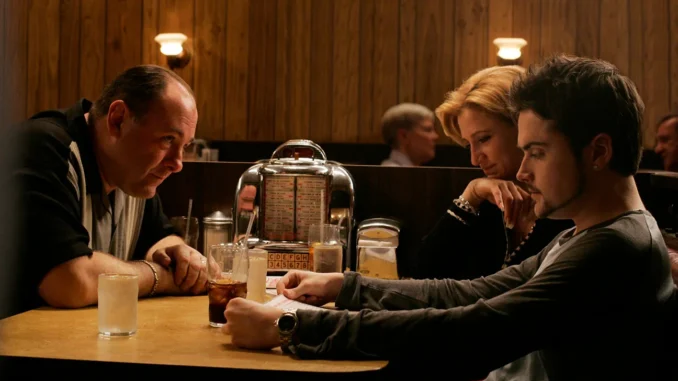
The finale of The Sopranos, titled “Made in America,” remains one of the most debated conclusions in television history. While fans and critics have dissected its ambiguous ending for years, one person’s reaction stands out: James Gandolfini, the iconic actor behind Tony Soprano. When he first saw the finale, his response was a simple yet powerful four-word critique: “That’s it? That’s it?”
The Legacy of The Sopranos
The Sopranos premiered in 1999, revolutionizing the television landscape and cementing its place in pop culture history. Over six seasons, it garnered critical acclaim, won numerous awards, and turned its cast into household names. The series masterfully blended drama and dark comedy, centering on the complexities of mob life and the personal struggles of its lead character, Tony Soprano.
The show concluded in 2007 with “Made in America,” an episode that left fans scratching their heads and pondering its meaning long after the credits rolled. The ambiguity surrounding Tony’s fate became a talking point, sparking endless theories and discussions.
A Divisive Finale
In “Made in America,” Tony Soprano faces various challenges, including rival mobster Phil Leotardo and the internal strife within his crew. The finale culminates in a tense scene at a diner, where Tony waits for his daughter Meadow to arrive. As Journey’s “Don’t Stop Believin'” plays, the camera captures Tony’s nervous glances at the diner entrance before the screen suddenly cuts to black, leaving viewers uncertain about his fate.
This abrupt ending led to a myriad of interpretations, with some fans believing it signified Tony’s death, while others viewed it as an open-ended conclusion. David Chase, the show’s creator, has often commented on the meaning behind the ending, suggesting that the story of Tony Soprano and his world continues, even if the viewers don’t see it.
Gandolfini’s Reaction: A Moment of Shock
Lorraine Bracco, who played Dr. Jennifer Melfi, provided insights into Gandolfini’s first viewing of the finale. During a recent discussion, she recalled watching the episode with him. “I was with Jim, and Jim said, ‘That’s it? That’s it?'” Bracco recounted, emphasizing Gandolfini’s disbelief at the ending.
When asked whether Gandolfini had been privy to the finale’s details before its airing, Bracco simply shook her head, confirming that he, like many fans, was left in shock. “I think he was in shock, like everybody else,” she noted. This revelation highlights the collaborative nature of the series, where even the lead actor was kept in the dark about how his character’s story would conclude.
Reactions from the Cast
Gandolfini’s initial reaction reflects a broader sentiment shared by the cast. Michael Imperioli, who played Christopher Moltisanti, remarked, “It was so sudden and strange. Really took everybody by surprise.” His comments suggest that while the ending was controversial, it also fit within the unpredictable nature of the series.
Drea de Matteo, known for her role as Adriana La Cerva, echoed this sentiment, suggesting that Chase’s vision for the show was always to maintain an air of uncertainty. “I’m thinking of myself, this is David. This is f****** David. This is exactly how he wanted to end the show. He doesn’t want anyone to know what’s going on right now,” she explained.
David Chase’s Perspective
David Chase’s approach to storytelling was always unconventional, and the series finale was no different. In discussions about the finale, he referenced the lyrics from “Don’t Stop Believin’,” suggesting that the story continues beyond what is shown on screen. “You may not go on,” Chase stated, “but the universe is going to go on, the movie’s going to keep going.” This philosophy aligns with the show’s exploration of life’s unpredictability and the cyclical nature of existence.
Chase’s commentary has done little to quell the debate among fans. Some viewers appreciate the ambiguous ending as a reflection of real life, where not all stories tie up neatly. Others, however, feel frustrated by the lack of closure, leading to ongoing discussions and theories about Tony’s fate.
A Cultural Milestone
Despite the divisiveness of its ending, “Made in America” is often hailed as one of the greatest series finales in television history. It stands as a testament to The Sopranos’ ability to challenge conventions and engage its audience on multiple levels. The show’s impact extends beyond its narrative, influencing countless other series that followed.
The documentary Wise Guy: David Chase and The Sopranos further explores the creation and legacy of the series. Featuring interviews with cast members and producers, it delves into the origins of The Sopranos and the personal connections between Chase and his characters. This retrospective allows fans to gain a deeper understanding of the show’s significance and its lasting impact on television.
Conclusion: A Lasting Impression
James Gandolfini’s blunt reaction to The Sopranos finale encapsulates the feelings of many fans and cast members alike. His shock and disbelief reflect the profound impact the series had on viewers, as well as the unexpected nature of its conclusion. Whether one views the ending as a bold artistic choice or a frustrating cliffhanger, there’s no denying that The Sopranos has left an indelible mark on the landscape of television.
As discussions around the finale continue, fans and critics alike are reminded of the show’s complexity, depth, and the rich tapestry of characters that made it a cultural phenomenon. The ambiguity of Tony Soprano’s fate will likely remain a topic of conversation for years to come, proving that sometimes, leaving things open-ended can be just as powerful as providing closure.
